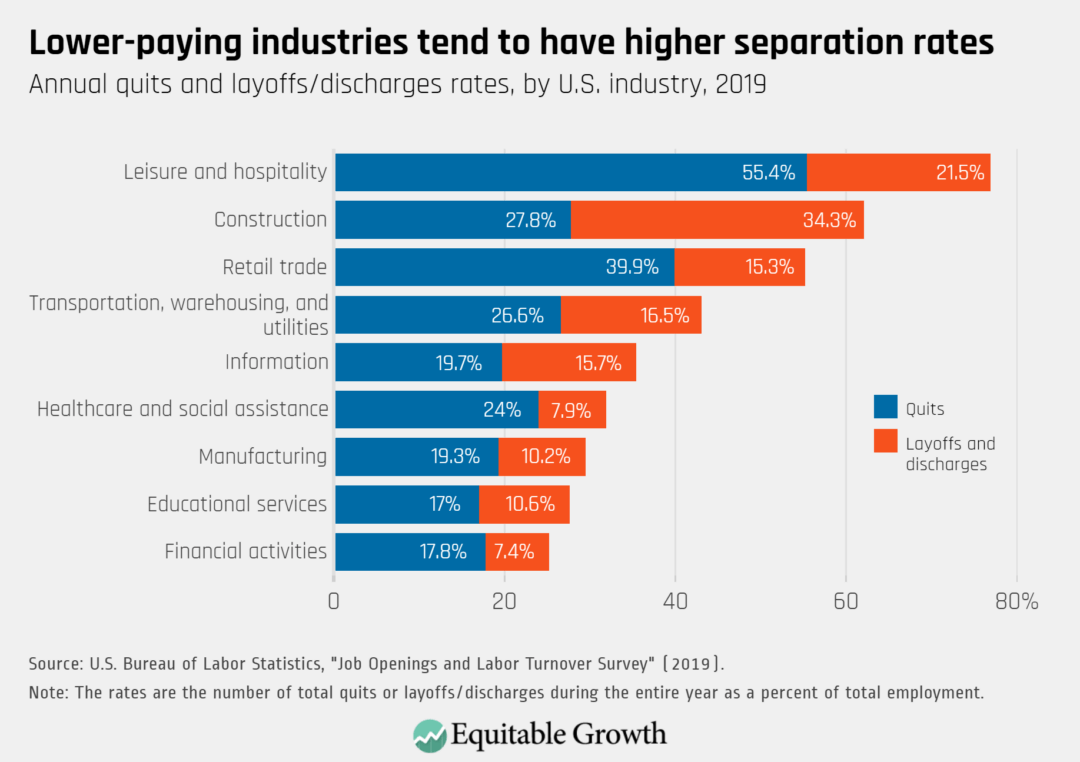Weekend reading: Improving job quality and labor standards in 2021 edition
This is a post we publish each Friday with links to articles that touch on economic inequality and growth. The first section is a round-up of what Equitable Growth published this week and the second is relevant and interesting articles we’re highlighting from elsewhere. We won’t be the first to share these articles, but we hope by taking a look back at the whole week, we can put them in context.
Equitable Growth round-up
While implementing policies that improve the quality of jobs in the United States may have some direct costs, such as raising wages or providing workers with more paid time off, the costs that arise from employee turnover can be huge—an average of 40 percent of an employee’s annual salary, to be exact. Kate Bahn and Carmen Sanchez Cumming look at how increasing job tenure via improved job quality can benefit employers and employees alike by reducing turnover costs and improving worker well-being. Bahn and Sanchez Cumming present the research behind the costs to employers of replacing workers and training new hires, which range from 2 percent to almost 150 percent of the individual employee’s annual salary, depending on the occupation and industry in question. They then describe several policy solutions that can reduce turnover by providing better jobs to begin with, including increasing the minimum wage and creating wage boards, boosting union membership, giving workers a voice in the workplace and in decision-making, and enforcing anti-discrimination protections for workers to reduce workplace hostility.
Paid family and medical leave is repeatedly shown to be an essential support for workers and their families—and amid the coronavirus pandemic and recession it likely will only grow in importance. Equitable Growth this week announced a trio of research grants to scholars exploring the role of this vital policy area during the current public health and economic crises. Sam Abbott and Alix Gould-Werth provide a brief overview of paid leave programs and their impact since the onset of the virus. They then describe the three projects that Equitable Growth is investing in to further study how paid leave programs have worked thus far in the pandemic and will continue to affect workers in the months and year ahead.
From January 3 through January 5, the Allied Social Science Associations, organized by the American Economic Association, held its annual 3-day meeting virtually. The conference featured hundreds of sessions on a wide range of economic and social science topics, and presented valuable research from these areas. Equitable Growth posted a round up for each day of the conference highlighting and summarizing the specific presentations that piqued our interest.
Links from around the web
The first day of 2021 brought with it a series of minimum wage hikes across the country. Twenty states and 32 cities and counties officially raised their pay floor, 27 of which brought their minimum wages to more than $15 per hour. The New York Times’ Gillian Friedman explains how raising the minimum wage grew in popularity across the political spectrum over the past 9 years—putting added pressure on the U.S. Congress to finally raise the federal minimum wage, which has been set at $7.25 per hour since 2009. In fact, Friedman writes, what started in 2012 as a small protest demanding fair pay outside a McDonalds has grown to such a point that even without congressional action, by 2026, 42 percent of Americans will work in a city or state that mandates a minimum wage of at least $15 per hour. In the wake of the coronavirus recession, these state and local wage hikes are providing a more secure standard of living for millions of workers across the country, particularly in low-wage, service-sector jobs. Proponents hope these efforts also will provide a baseline for expanding these pay standards to more workers.
Earlier this week, more than 220 workers at Alphabet Inc.’s Google unit announced that they unionized, potentially signaling the start of worker organizing and activism in Big Tech. Recode’s Shirin Ghaffary provides a brief explainer on what the union can (and can’t) accomplish, and its potential impact on Google, its parent company, and other technology companies that have largely avoided or suppressed unionization efforts thus far. This new activism could be particularly important in the current moment, when policymakers are focused on regulating Big Tech and activists are highlighting workplace culture issues within these companies. Ghaffary then looks at the long road ahead for these workers, especially considering Google employees’ previous attempts to unionize.
Friday figure

Figure is from Equitable Growth’s “Improving U.S. labor standards and the quality of jobs to reduce the costs of employee turnover to U.S. companies” by Kate Bahn and Carmen Sanchez Cumming.
